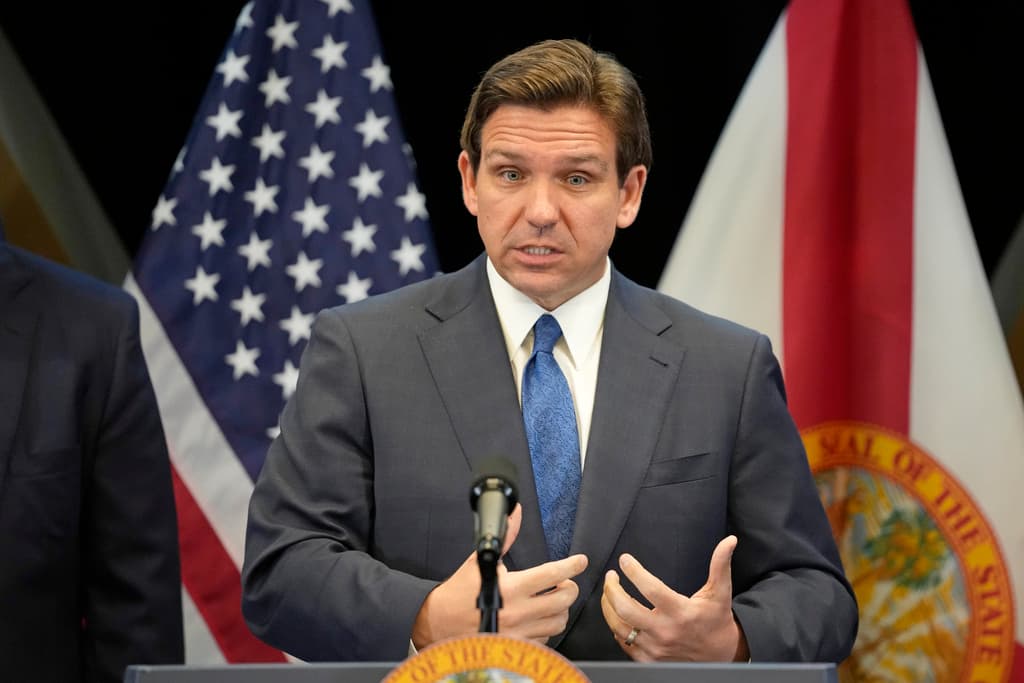Analysts Caution Against Counting DeSantis Out After His ‘Bad Week’ in Washington
DeSantis’s bad week won’t sink his campaign, and by some measures his position, even in the polls, looks pretty favorable.

After a disappointing visit to Washington, D.C., and amid slipping poll numbers, some are calling Governor DeSantis’s presidential campaign dead before it even begins. If history is a guide, though, the battle for the 2024 Republican nomination is only getting started.
In the past few days, three representatives from Mr. DeSantis’s own state have endorsed President Trump in the 2024 presidential race, John Rutherford, Greg Steube, and Brian Mast.
Their endorsements came as a rebuke of Mr. DeSantis, after the governor reportedly asked members of his state delegation to refrain from endorsing a presidential candidate just last week.
Walking out of a meeting between congressional Republicans and Mr. DeSantis yesterday, Representative Lance Gooden of Texas announced his support for Mr. Trump in a stunning show of loyalty to the president and a snub to Mr. DeSantis.
“I met with Governor DeSantis, and while he has done commendable work in Florida, there is no doubt in my mind that President Trump is the only leader who can save America,” Mr. Gooden said.
Combine this with Mr. DeSantis’s sliding poll numbers — most recent surveys show Mr. Trump in the ballpark of 20 points ahead of Mr. DeSantis among Republicans — and Mr. DeSantis’s primary prospects appear to be dimming.
Yet Mr. DeSantis’s bad week won’t sink his campaign, and by some measures his position, even in the polls, looks pretty favorable.
A professor of political science at John Jay College, Brian Arbour, tells the Sun that polls are only “modestly predictive at this point.” What the early polling is useful for, he says, is predicting who will be “a serious candidate a year from now.”
“It’s not predictive in the sense that whoever is leading in the polls now will win or that candidates can’t come back from polling deficits,” Mr. Arbour said.
By this measure, Mr. DeSantis’s position actually looks fairly favorable. Even if Mr. Trump is leading by 20 points, Mr. DeSantis is far outpacing the rest of the Republican field.
While it’s become popular to compare the 2024 Republican primary to that of 2016 — and there are some similarities — the situation is perhaps more analogous to the 2008 primary.
In the summer of 2007, it was Secretary Clinton, then a senator of New York, who led President Obama, then a senator of Illinois. One Gallup poll in June that year gave Mrs. Clinton an 11-point lead over Mr. Obama.
On the Republican side, Mayor Giuliani was the favorite in spring 2007, leading Senator McCain by 14 points in March, according to one Gallup survey, before seeing support drop off due to his stance on abortion.
On both sides, polling at this stage of the 2008 primary predicted who would be a serious candidate over the next year, but was not helpful regarding who would end up winning.
In Mr. Arbour’s analysis, fundraising and the positioning of party elites are more important trackers at this stage of the race, even if they are a little harder to quantify than poll numbers.
Mr. DeSantis so far has raised over $110 million for his war chest across a number of allied committees, and he has considerable backing from Republican institutions like the Club for Growth.
Mr. Trump racked up a mountain of cash in the first quarter of 2023, $18.8 million across his joint fundraising committee and his campaign. At the beginning of the year Mr. Trump had a reported war chest of about $95 million, meaning that, though fundraising totals are not available at the moment, the two candidates probably have similar financial backing.
According to a data scientist at Decision Desk HQ who is a professor of data science at Washington University in St. Louis, Liberty Vittert, this is the stage where candidates are “stocking up their war chests.”
According to Ms. Vittert, money raised is “definitely something to look at” at this point. On that front Messrs. Trump and DeSantis look fairly evenly matched.
“Primary polling hasn’t been shown to be predictive until late summer so I would say it isn’t worth looking at yet,” Ms. Vittert tells the Sun.
As for the other metric that Mr. Arbour indicated could be predictive — the positions of party elites — there’s little precedent for what’s happening in the GOP today.
In the 2008 Democratic primary, those who endorsed a candidate early tended to endorse Mrs. Clinton while those who endorsed later tended to endorse Mr. Obama. Today’s GOP, though, seems to be in a full-on battle for control of the party.
While in the past, such as the 2000 presidential primary, GOP elites have acted in concert to promote a candidate, this time they are historically divided. The best example of this is probably from early March, when Mr. Trump attended CPAC while Mr. DeSantis courted the Club for Growth.
While it’s unclear at this point which faction will win out in the end, it is apparent from developments like Mr. Gooden’s announcement yesterday that the battle is both fierce and ongoing.
“Part of the story of the Republican Party in the last 8 years is that it’s unclear that the traditional party leaders are in charge of the party,” Mr. Arbour said.

